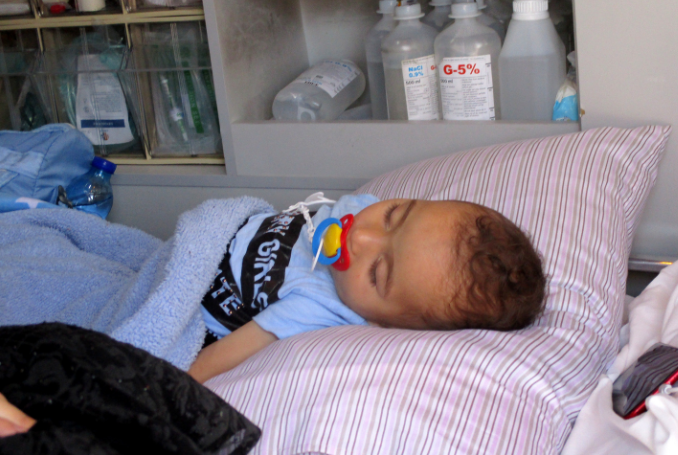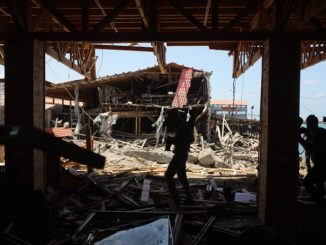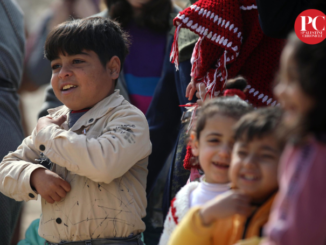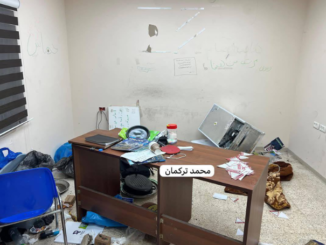
In the corner of his living room, 34-year-old Basheer lay on his bed, his urinary catheter visible below his blanket. He is very sick; yet, his mother has been banned from traveling with him to Jerusalem for cancer treatments since October 2022.
His medical problems began in 1990 when he was infected with giardia parasites at the age of two, resulting in diarrhea for two months. After that, he completely lost his ability to defecate leading to fecal impaction. He got the permit that year to travel with his mother to Hadassah Ein Kerem Hospital in Jerusalem. Surgeons removed all the accumulated hardened stool as well as the anal sphincter since it was severely damaged from the impaction.
Then they made him an ileostomy, which connects the small intestine to an opening in the abdominal wall. Having an ileostomy, Basheer did not absorb the nutrients in food, resulting in a delay in his growth. When he was 15, he weighed 36 kg, about 79 lbs.
Basheer was wearing diapers until he was 16, as his bladder was damaged from the fecal impaction that happened at the age of two and the urine was passed out via his damaged anus.
At this age, Basheer and his father were permitted to enter Israel. Surgeons in Ichilov Hospital in Tel Aviv closed the ileostomy and made a colostomy, which connects the colon to the abdominal wall, for better absorption of the nutrients in food. They also made a urostomy, which connects the urinary tract to the abdominal wall, so that he can stop using diapers.
“I always try to be isolated from people because at any time a bad smell can come from the colostomy and people get irritated. Even when I was a student at university, I always sat far away from my colleagues to avoid any bad reactions or words from people,” Basheer said in a strained, strangulated voice.
At 32, a rectal tonsil started growing out of his anus, eventually becoming 14 cm long and 7 cm wide (5.5” x 2.75”). He was also diagnosed with rectal cancer.
Basheer travels to Jerusalem every two weeks to undergo chemotherapy and radiation sessions at the Augusta Victoria Hospital.
On the first trip for cancer treatment, on September 10, 2022, his mother was permitted to accompany him but then she was banned on the following trips.
“Israeli authorities sent me a message that I am permitted to travel with Basheer. However, an Israeli soldier at Erez Crossing told me ‘You are not allowed to pass.’ My son entered Jerusalem alone. And then his maternal aunt, 63, was permitted to follow him there. But my sister is too old to take care of him and she has a family while Basheer has to stay in Jerusalem from 7 to 9 days on every trip,” his mother, 58, said, describing her first ban in October of 2022.
His maternal aunt being too old is not the only reason his mother is protesting the ban from accompanying him.
“When he removes the feces from the colostomy, I stand by him to help. I disinfect the rectal tonsil for him. I am his mother and I can do this for him. I would love to help my son but my sister would not like to do it. And Basheer refuses to be helped by his aunt in this,” the mother explained.
Augusta Victoria Hospital is already crowded so they move cancer patients to the hotel after being done with the radiation session.
“In the hospital, the nurses help him but when he is in the hotel he needs me to help him,” she said. “Why do they ban me? Why do they make a barrier between me and him? My ailing son needs me. I am unarmed; I cause no harm to them. I only think about one thing: my son.”
Malek: ‘I Only Want My Mom’
As he cannot urinate regularly, Malek, 8, has to use a urinary catheter most of the time.
Since his birth, he has suffered from a neurogenic bladder. In 2019 he was permitted, with his mother accompanying him, to undergo surgery at the Saint Joseph Hospital in Jerusalem. There, surgeons performed ureters transplantation since his kidneys were enlarged due to a congenital defect of the ureter.
However, this surgery did not end the problem and Malek still uses the catheter.
Doctors in Gaza failed to diagnose his exact problem and to know how to treat it. Therefore, they advised Malek’s parents to go to Saint Joseph Hospital again to study his case and solve the root problem.
Malek’s parents were both banned three times by the Israeli authorities from accompanying their little son in the autumn of 2022. No one other than his parents can accompany him since his maternal aunt is disabled and his maternal uncle is a child and one of his paternal uncles is also banned and the other is sick.
“We wanted to look for someone outside the family to volunteer to accompany my son but Malek cried out loud and said he doesn’t want anyone other than me. And I know that no one can take care of my son like me,” his mother, 32, said.
Malek uses the urinary catheter for four or five days, and removes it for four days. It causes him extreme pain and severe inflammation in his bladder.
“Once while the Gaza doctor was putting the catheter in him, Malek screamed and said,‘It kills me. It kills me. Please, doctor, don’t put it in me again’,” his mother recalled.
Malek used to go out to play with other children with the catheter in but now stopped because he cannot play well with the bag dangling. He now only plays on the days when the catheter is removed.
“On his days with the catheter, my son stands at the main door and looks at the children playing. Then he closes the door and enters the home, feeling inferior to them,” the mother said in sheer agony.
Malek needs to go to Saint Joseph Hospital in Jerusalem for treatment, so he can get rid of the catheter. Gaza doctors have warned his parents that any delay in treatment could result in his bladder rupturing.
“I don’t want the catheter. I only want my mom to go with me to the hospital,” the innocent little Malek said.
Mohammed Abuhashem, a legal researcher at the Palestinian Center for Human Rights, said that,
“Preventing Palestinians from moving within areas recognized as Palestinian by international law, which are The Gaza Strip and the West Bank including Jerusalem, for any reason is a violation of the right to movement. The International Covenant on Civil and Political Rights guarantees the right of every person to move within the territory of his country.
“And because it is related to health, the rejection, in this case, makes the matter worse, as it is a violation of the right to health and an affront to human dignity, and human dignity is the goal of all human rights agreements. This rejection could amount to a crime against humanity if it is practiced systematically and on a large scale.”.
As for the areas considered Israeli areas under international law, Israel has the power to allow and prevent the entrance of anyone. However, preventing Palestinian patients and their companions could amount to the arbitrary use of power, particularly since Israel is the one responsible for weakening the medical capabilities of the Palestinians, making them dependent on Israeli hospitals, Abuhashem noted.
(Patients’ names have been changed to protect their privacy)

Lubna Abuhashem is a freelance writer and translator from Gaza. We Are Not Numbers contributed this article to The Palestine Chronicle.







